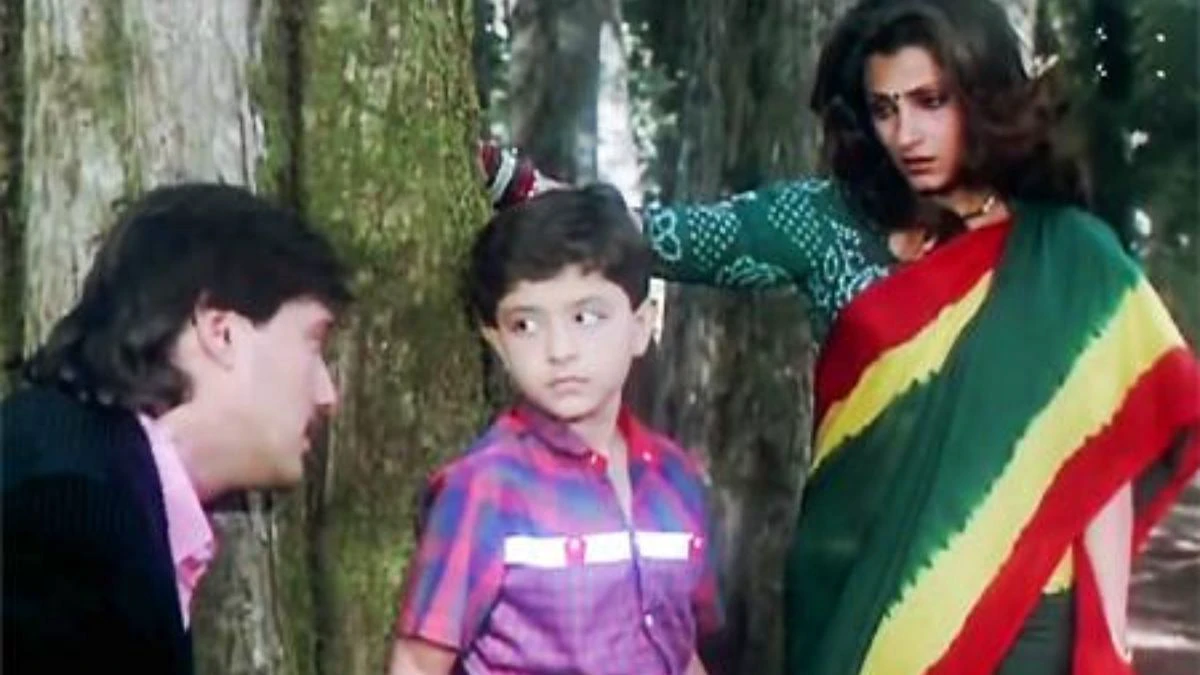Child actors can often be the emotional core of a movie. Jugal Hansraj’s innocence and vulnerability was the beating heart of Masoom (1983).
Shahinda Baig, popularly known as Baby Guddu, enjoyed the kind of fame that veteran actors dreamed of, especially in Samundar (1986).
But one of the most overlooked performances in Indian cinema is Master Makrand’s role as Romi in Mahesh Bhatt’s Kaash (1987), a film that unravels the tragedy of a failed marriage. The movie follows the life of a successful actor, Ritesh (Jackie Shroff), whose career takes a nose-dive. He becomes an alcoholic and self-destructs. Romi is the silent observer as he watches his mother, Pooja, played by Dimple Kapadia, confront her husband. She takes on multiple jobs to support the family. She becomes the family’s sole breadwinner, which Ritesh’s already bruised ego cannot handle.
Ultimately, Pooja leaves the house with Romi. But this is a Bollywood melodrama. Romi is diagnosed with cancer, and the warring couple reunite to save their son.
“Romi humse apna karz mang raha hai. Jo mamta, pyar hum 100 saal mai dete, voh hum ab bhi de sakte hai,” Ritesh explains to Pooja, who is heartbroken after learning her child’s health condition.
Kaash risks becoming too idealistic, but the balanced, or rather bittersweet, ending brings a much-needed touch of reality to it. The reviews were divisive. Some critics panned it, but others praised the way Bhatt handled serious topics without “going overboard”.
Romi: the showstopper
Romi’s natural and honest portrayal of a child, grappling with his parents’ separation and then cancer, stood out.
Confusion, sadness, and longing formed the film’s emotional core, and that’s why it hits a chord with the audience. It’s a credit to both him and Bhatt, who use subtle gestures to show the disintegration of their marriage.
When Ritesh lashes out at Pooja after spotting her with another man, or gets into a violent fight with a local shopkeeper, it’s Romi’s reaction-fear in his eyes-that gives added depth to the scenes. Master Makrand never appeared to be acting. He lived the character, showcasing the innocence and pain of every child who gets caught in the adult world’s emotional chaos.
The courtroom scene where the judge asks Romi to choose between his parents powerfully captures his sense of helplessness. Later, while living with his father, Romi ends up as the caretaker-the adult in the relationship.
In one of the scenes, Ritesh attends a party hosted by his friend Vijay Kumar (Dalip Tahil) and ends up getting drunk. In a vulnerable moment, he attempts to steal money but is caught in the act, leading to a heated confrontation with Kumar. During the chaos, Romi steps in to defend his father and manages to bring him home safely. Once home, Romi gently helps his intoxicated father into bed and takes off his shoes.
Both Jackie Shroff and Dimple Kapadia appear to be in supporting roles as Master Makrand does the heavy lifting.
Tidal waves of emotions
Despite the film’s somber tone, Bhatt delivers a deeply emotional gut-punch midway.
In a scene where Ritesh and Pooja take Romi on a vacation, the family enjoys a rare lighthearted moment in the meadows. The atmosphere is warm and hopeful-until Romi, mid-laughter, turns to his father and quietly says, “Main aur jeena chahta hoon, Papa. (I want to live more Papa).”
That one line leaves the audience devastated.
After Romi’s health diagnosis, every scene featuring him carries a heavy emotional weight, often eclipsing the performances of Shroff and Kapadia. However, in one standout moment, Kapadia’s portrayal of Pooja takes center stage, capturing your full attention and evoking deep sympathy for the mother.
Her emotional outburst of a mother overwhelmed by grief, love, and helplessness toward her child is gut-wrenching. She screams until her voice is hoarse, her body tense with frustration and despair.
Her friend Alok (played by Anupam Kher) steps back, mirroring the audience’s shock at the intensity of Kapadia’s pain. At that moment, the scene belongs entirely to Kapadia. It’s a masterclass in performance.
The film’s music, composed by Rajesh Roshan, complements the characters’ emotional depth.
Sung by Kishore Kumar, “Baad Muddat Ke Hum Tum” is picturised against Ritesh reminiscing about his old glory days and getting a reality check of his current situation.
Another track, “O Yaara” by Kishore Kumar and Anupama Deshpande, enhances the storytelling, providing a melodic backdrop to the parents’ emotional turmoil as they hold themselves together in front of their child.
Kaash is not just about death. It is a story of life-with all the tragedies and little joys, mistakes and reparations. And it’s aged well.
Decades later, the film remains relevant, as many children today still find themselves caught in the middle of broken or unhappy marriages.
